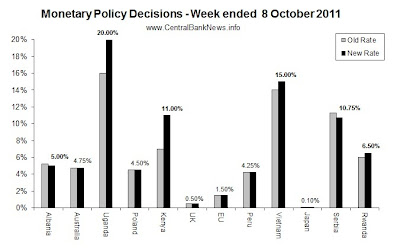The past week in monetary policy saw 12 central banks reviewing monetary policy settings, with 6 adjusting interest rates. Those that changed interest rates were: Albania -25bps to 5.00%, Uganda +400bps to 20.00%, Kenya +400bps to 11.00%, Vietnam +100bps to 15.00%, Serbia -50bps to 10.75%, and Rwanda +50bps to 6.50%. Those that held rates unchanged were: Australia 4.75%, Poland 4.50%, UK 0.50%, EU 1.50%, Peru 4.25%, and Japan 0.10%. Also making news in monetary policy was the announcement from the Bank of England that it would add a further GBP 75 billion to its Asset Purchase Program (quantitative easing). Similarly the ECB announced a set of liquidity and asset buying measures in its monetary policy announcement.
Following are some of the key quotes of the week from the monetary policy setters:
- Bank of England (held rate at 0.50%, expanded asset purchase program GBP 75B): “The pace of global expansion has slackened, especially in the United Kingdom’s main export markets. Vulnerabilities associated with the indebtedness of some euro-area sovereigns and banks have resulted in severe strains in bank funding markets and financial markets more generally. These tensions in the world economy threaten the UK recovery.”
- Central Bank of Kenya (increased rate 400bps to 11.00%): The CBK “will revise the CBR further if inflation and exchange rate volatility do not abate.” also noting: “inflationary pressure has continued to increase and both the weakening of the shilling and its volatility poses additional threats.”
- Bank of Uganda (increased rate 400bps to 20.00%): “This should be seen as a clear signal to bring inflation under control,” signalling a hard-line against Uganda’s double digit inflation; “However, should the upside risk to inflation continue in the months ahead, then monetary policy will be tightened further.”
- National Bank of Serbia (dropped rate -50bps to 10.75%): “The Executive Board expects that inflation will continue to decline and that it will enter the target tolerance band in the first half of the next year. The future path of the key policy rate will depend on the achievement of projected inflation, and on the materialisation of risks, primarily those stemming from the international environment and fiscal policy at home.”
- National Bank of Rwanda (increased rate 50bps to 6.50%): “the real economic growth in Rwanda is likely to exceed the 7 percent initially projected for the year 2011. It is expected to reach 8.8 percent whereas the inflation forecast is at 8.2 percent by end December 2011. Considering these projections, the Central Bank finds it appropriate to review its policy rate in order to keep the monetary aggregates at optimal levels to limit inflation pressures while continuing to support economic growth.”
- Bank of Albania (dropped rate -25bps to 5.00%): “This serves the achievement of the inflation’s objective in middle-term periods and at the same time it offers the necessary monetary conditions to stimulate economic activities in the country. I believe that this measure will be transmitted at the defined level,”
- Bank of Japan (held rate at 0-0.10%): “Japan’s economic activity has continued picking up. Production and exports have continued to increase, although their paces have moderated after going through the recovery phase immediately following the quake-induced plunge… business fixed investment has been increasing moderately, and private consumption has been picking up on the whole.”
Looking at the central bank calendar, next week is set to be a relatively quieter week with just 3 banks scheduled to meet. Also keep an eye out for the US FOMC (Federal Open Market Committee) meeting minutes from its 20 September meeting, likewise the Bank of Japan will also be releasing monetary policy meeting minutes this week.
- IDR – Indonesia (Bank Indonesia) expected to hold at on the 11th of Oct
- KRW – South Korea (Bank of Korea) expected to hold at on the 13th of Oct
- MXN – Mexico (Banco de Mexico) expected to hold at on the 14th of Oct
